2012 London OlympicsAug 3, 2012 by Gina Mueller
Phelps tops Olympic gymnast Larisa Latynina's record
Phelps tops Olympic gymnast Larisa Latynina's record
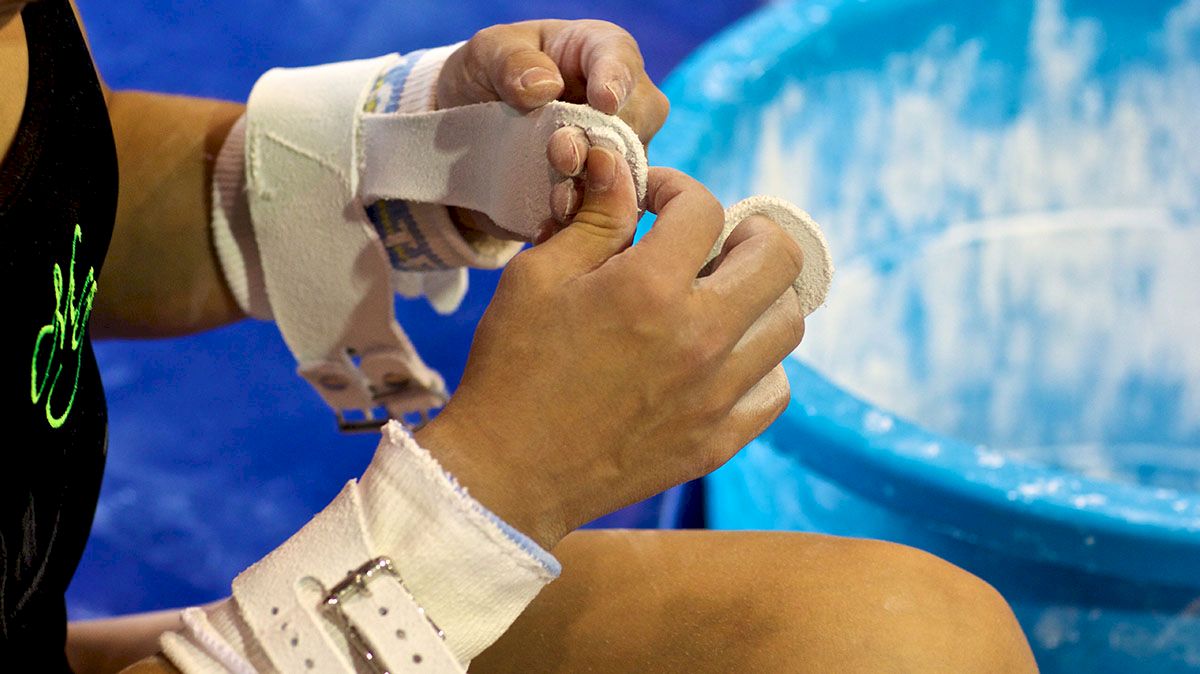
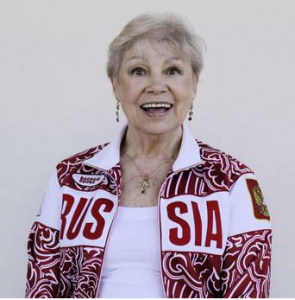
Photo: Justin Sutcliffe
For 48 years Larisa Latynina's record has been untouchable. The former Soviet gymnast's total of 18 Olympic medals put her far above the reach of any other Olympian. But the 77-year-old has delighted in the fact that this year, someone has surpassed her. American swimmer Michael Phelps came into London with 16 Olympic medals, 14 of them gold. Latynina was well aware that there was a chance of her record being broken by Phelps at the 2012 Olympic games.
Earlier this year Latynina met Phelps for the first time in New York. She presented him with a medal she was awarded in a Soviet-American dual meet in 1962. The topics of conversation ranged from training, to Phelps' retirement after the 2012 Olympic games. Heading into the 4x200 race on Tuesday, Latynina was prepared to watch Phelps surpass her record that she has held for nearly half a century. According to the New York Times, She had joked that it was time for a man to be able to do what a woman had done long ago.
Latynina was born in 1934 in the Black Sea port of Kherson. At this time, Ukraine was still under Soviet control. Latynina went on to make her Olympic debut in 1956, where she won six medals, one of which was on a discontinued event called the portable apparatus. The portable apparatus event was very much like todays rhythmic gymnastics. It was first introduced at the 1952 Olympic Games in Finland and then discontinued after the 1956 Olympics in Australia. Out of her six medals, she earned four gold, one silver and one bronze. The streak continued with another six medals in Rome in 1960. She again led the Soviet Union to team gold and individually won gold in the all-around and floor exercise, silver on the beam and uneven bars, and bronze on the vault.
Prior to those Olympics, Latynina competed at the 1958 World Championships while four months pregnant. The only person that knew about her pregnancy was her doctor. According to the New York Times Latynina said, “I couldn’t say anything because they wouldn’t have allowed me to participate.” She still won five out of the six titles at the competition. Months later, she gave birth to her daughter, Tatyana. Tatyana told the New York Times that she considers the medals her mother won in 1958 to be hers as well. “I consider them mine,” she said with a laugh. “We won them together.”
During the time that Latynina competed in gymnastics, it was a different kind of sport. It was less demanding and more artistic. There was no doubt that the Soviet Union was dominant and Latynina was the most accomplished. Latynina celebrated her maturity in the sport. She was proud of her age and proud of the success she still was achieving. Her dance background allowed all eyes to be drawn to her during events such as the floor exercise and the balance beam. She had perfect posture and classic lines that gymnastics fans still admire. At this time, gymnastics was performed mostly by women and not young girls.
Latynina won her last six medals at the 1964 Olympic Games in Tokyo. For the third time in a row she won gold in the team competition and on the floor exercise. She also took silver in the all-around and the vault and bronze on the uneven bars and balance beam. Latynina's nine gold medals place her second on the list of most Olympic gold medals alongside athletes such as Carl Lewis, Mark Spitz and Paavo Nurmi. They are all exceeded by none other than Michael Phelps, who now has 17.
Despite giving Phelps her blessing, Latynina's competitive nature has not subsided. In 1992, an award was given for the greatest gymnast of the 20th century, which went to the Romanian, Nadia Comaneci. Comaneci was the first gymnast to score a perfect 10 out of 10 at an Olympic event in 1976. The rejection still sticks with Latynina today.
According to The Independent, she said, "When they were deciding who it should go to, Comaneci had a very good PR. She only had four gold medals. Gymnastics is a very subjective sport. If a runner runs fastest, he gets the best time – that's objective, but in gymnastics it's just decided by judges. To be honest I was upset. These were the awards for the best gymnast and I was surprised because I was expecting it. The results were unfair, but at the time of the award I congratulated her."
As she neared the loss of her record, Latynina actually gained more attention than when she set it. Olympic television was still in it's early stages during her era, the Cold War raged and the Soviet Union was a closed society. Some would say that Latynina got lost in history, but her story has resurfaced in the media and enjoyed the attention from the recent uproar surrounding Phelps.
As Phelps finished his race that awarded him his 19th medal, Latynina could be seen giving a standing ovation in the crowd. She wanted to present Phelps with his 19th, record-breaking medal, but the Olympic rules wouldn't allow it. While clapping for Phelps, Latynina was wearing a blue shirt with "RUSSIA" across the front and white slacks, honoring the man who broke her record from the United States, but still representing her favorite country.
Interesting Facts:
- She is the only woman who has won an all-around medal in more than two Olympiads.
- She is the only woman who has won an individual event (floor exercise) in more than two Olympiads.
- Latynina is one of only three women who have won every individual event at either the World Championship or Olympic level.
Related Content
 Replay: Lander vs Mars Hill | Mar 28 @ 6 PM
Replay: Lander vs Mars Hill | Mar 28 @ 6 PMMar 29, 2024
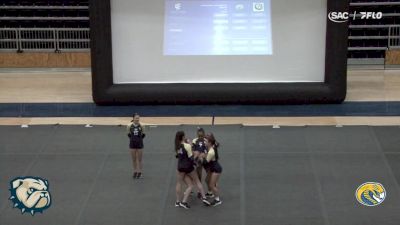 Replay: Coker vs Wingate | Mar 21 @ 6 PM
Replay: Coker vs Wingate | Mar 21 @ 6 PMMar 22, 2024
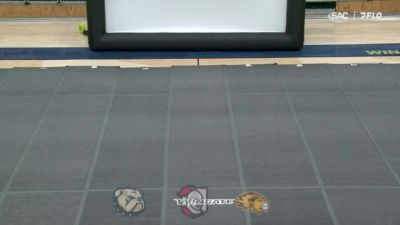 Replay: Wingate Tri-Meet - Acrobatics & Tumbling | Mar 15 @ 5 PM
Replay: Wingate Tri-Meet - Acrobatics & Tumbling | Mar 15 @ 5 PMMar 15, 2024
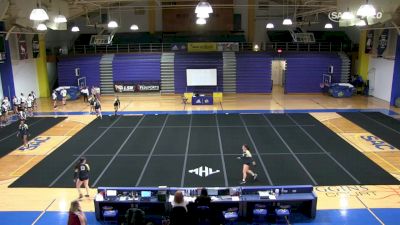 Replay: Mars Hill Tri-Meet | Feb 16 @ 6 PM
Replay: Mars Hill Tri-Meet | Feb 16 @ 6 PMFeb 17, 2024
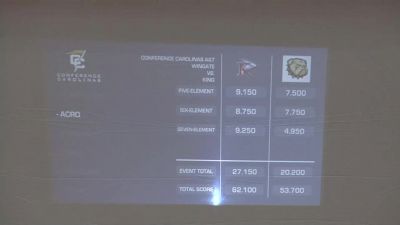 Replay: King (TN) vs Wingate - 2024 2024 King (TN) vs Wingate - Acrobatics & Tumbling | Feb 10 @ 4 PM
Replay: King (TN) vs Wingate - 2024 2024 King (TN) vs Wingate - Acrobatics & Tumbling | Feb 10 @ 4 PMFeb 10, 2024
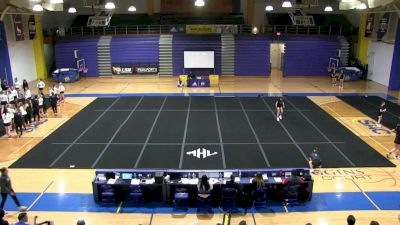 Replay: Belmont Abbey vs Mars Hill | Feb 10 @ 3 PM
Replay: Belmont Abbey vs Mars Hill | Feb 10 @ 3 PMFeb 10, 2024
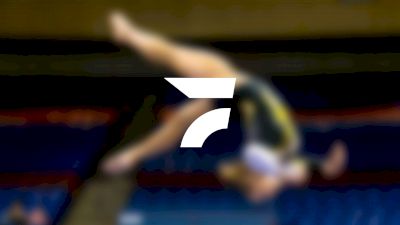 How to Watch: 2024 King (TN) vs Wingate - Acrobatics & Tumbling | Gymnastics
How to Watch: 2024 King (TN) vs Wingate - Acrobatics & Tumbling | GymnasticsFeb 10, 2024
 How to Watch: 2024 Wingate Tri-Meet | Gymnastics
How to Watch: 2024 Wingate Tri-Meet | GymnasticsFeb 8, 2024
 How to Watch: 2024 Wingate Tri-Meet | Gymnastics
How to Watch: 2024 Wingate Tri-Meet | GymnasticsFeb 8, 2024